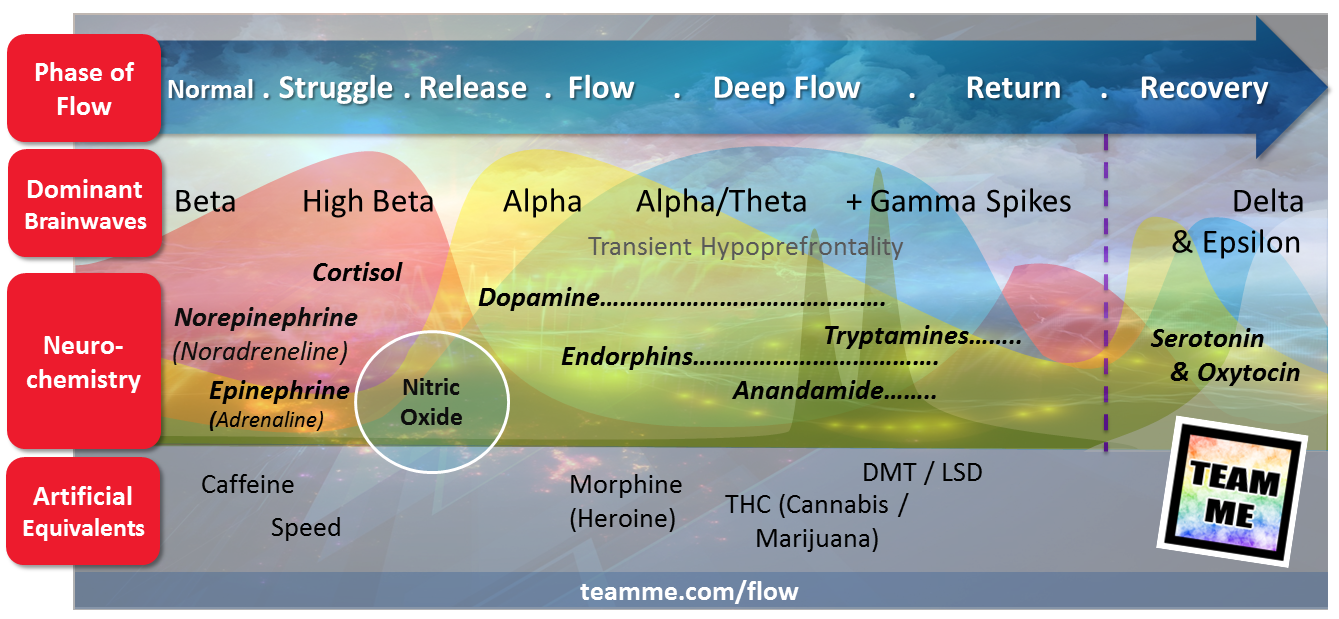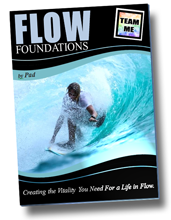|
Whilst flow is not a state we can force into existence, there are many things we can do to ‘hack’ our brains, our routines and set up our activities to become much more prone to entering a flow state – a state where we perform much more effectively and also find we enjoy the process a whole lot more. In Part 1: Discovering the Flow State, we became familiar with the essentials of this extraordinary condition. Now time to explore how, specifically, we can start to tap into this exceptional state each and every day. There are degrees of flow, of course, and some activities lend themselves to a deeper flow state than others. Activities that take you to the very edge of your capabilities, that propel you into a rich, sensory environment and alter the usual ground-hugging effect of gravity will quickly take you there. However, practically any task can be improved by ‘setting up’ the conditions so that flow comes more readily, more naturally. Your day job may not involve sky-diving, surfing or skiing; painting, singing or writing novels but it’s possible for even bricklayers and mechanics, nurses and childcarers, trainers and truck-drivers to find themselves in an extraordinarily altered state of mind when certain conditions are met. Here, our usual sense of time seems to change, our sense of self vanishes as we become one with the activity and environment and things seem to come to us without effort. Focusing for a moment on solo activities - rather than team activities that introduce a wider range of dynamics - the ‘set up’ is key to a productive, protracted period of perfect performance. (Ok, that’s enough ‘p’s for a while!) A Tale of Two Set UpsThe second set-up relates to the hard core, moments of focused action where we’re pushing our limits and in the zone, creating magic. But it’s the less glamorous of the two set-ups needs to be considered first. This level focuses on long term physical, mental and environmental factors that need to be fostered and maintained daily to provide a fertile breeding ground for those intense and highly productive flow events to emerge. A gardener has a responsibility to ensure the whole garden is well watered, free from pollutants and pests, whilst maintaining a good balance in the acidity and nutrition levels of the soil. Only once she’s set up these essential environmental factors can she sensibly start to focus on the husbandry needs of each individual plant. The garden would also benefit from the regular scheduling of all these tedious maintenance tasks so that each one is addressed in a consistent and methodical manner. Even a novice horticulturalist quickly recognises that sporadic, haphazard or irregular maintenance is not conducive to the health and longevity of their garden. As an athlete, you would be wise to focus your training on the execution of the specific moves you need to perform on the field but you also need to ensure your body and mind are in an optimal ‘base-line’ state. Your performance depends on your aerobic capacity, muscle tone, flexibility, freedom from pain and inflammation, your blood sugar levels, a continually positive attitude and more besides. These matters are addressed by 7, purposeful, regular but not-particularly-sexy activities that you can incorporate into your daily life to become more prone to flow. 7 Flow State Foundations1. Stillness. Quietness can be measured in degrees, of course, but those who have regular times of stillness scheduled into their days are much more able to find flow in their daily activities. Yet stillness is not just something to attain through sitting quietly and alone in a dimly-lit room or on a park bench, it is a state of mind that maintains an unhurried, unthreatened, undisturbed attitude even whilst people scurry around you and make demands of you. 2. Movement. As Pete Egascue said, if an alien visited earth for the first time and examined the human form, she would almost certainly conclude the human body has been designed to move. Ensuring your body is moving regularly and fully is essential to keep it in good shape. Movement starts with breath and so learning to manage your breath plays a key role in any method of movement as well as the management of mental states. 3. Sleep. For many people, getting adequate sleep means sleeping longer and more deeply; removing anything that might disturb the processes the body and mind need to perform to rest, assimilate and restore all functions without disruption. Ensure your mind winds down before you sleep. Avoid watching screens until you stagger into bed. Make your room as dark and comfortable as possible. Turn off all electronic gadgets. Time your WiFi to go off an hour before you sleep or at least set your phone and tablet to flight mode. As much as possible, minimise your need to rise during the night. 4. Healthy diet. A considered, balanced and consistent diet does wonders for both mind and body. Plenty of water, fresh coloured organic vegetables and fruit along with vital oils and healthy fats and a reduced sugar intake are essential to vitality and longevity. Setting boundaries around what you habitually ingest is an important foundational practice and forces you to make alternative choices that, over time, themselves become habits. 5. Routine. It’s not that we should establish a rigid schedule for everything and set in stone exactly what we do down to the minute for each day of the week, rather that we ensure certain, essential and productive activities are diarised so that we get the important stuff done. This is helpful not just because it ensures continual progress but also because it silences that niggling voice that pops-up to remind us of what we haven’t done. Such matters distract and divert our attention as well as drain away energies that should be channeled to getting things done. Whilst the tasks of life are seemingly endless, it takes a weigh off the mind when neglected tasks are finally cleared away. 6. Variety. There are some activities that are absolutely critical to your profession. These you should have practiced so many times over that you can perform them perfectly and without any conscious thought at all. Yet to help trigger a new kind of awareness you should plan to shake things up a little. From swapping to your 'other hand' when brushing your teeth, to varying where you actually eat your breakfast, there are a thousand little things you could do differently. Strange as this may seem, such actions help provide just a little extra challenge and life you out of your daily zombie state of mind - pulling you into the present and giving you a novel set of experiences to process along the way. 7. Awe. If nothing in your day inspires you to feel a genuine sense of awe, you need to either seek out things that do or learn to find what is actually awesome in the everyday things around you. Those who know flow are those able to look at a leaf for many, many minutes and find countless awesome things about it. Take a good few minutes to look at things that inspire awe: this might include images of nature – both the micro and macro (big stuff like astronomical bodies)-, as well as extreme sports videos, magnificent architecture, whales, glaciers, paintings, acrobats in action - anything that causes your chest to fill with air and your eyes to gawp in wonder. Time To Act
These new habits, and many more you can imagine along the same lines, are your key to setting things up in a way that makes flow a more natural and regular part of your life. Practice them and you’ll find you’re primed to much more readily go with the flow.
|
AuthorPad is a trusted adviser to business leaders across the globe. He is Director at Come Alive Success Coaching ltd. and the Author of TEAM ME - How to Play Your Best Game in Life, and TEAM GUY - Forging Men of Soul & Steel. Archives
August 2023
Categories
All
|







 RSS Feed
RSS Feed